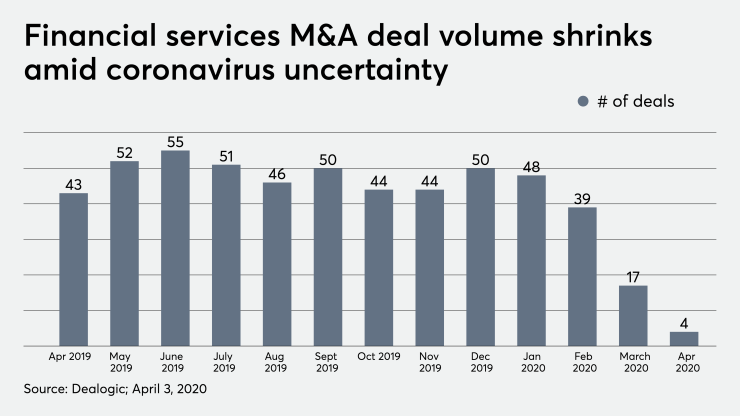In recent weeks, the
The question arises as the coronavirus creates an unprecedented public health crisis and the U.S. economy goes into a tailspin. Markets are experiencing their
And with much of America sheltering in place, Schwab and TD may have to plan their integration with most —
“Regardless of what type of transaction you were contemplating at the beginning of the year — just because of the volatility of the market and the uncertain times — you’re probably going to be rethinking it,” says Kent Schmidt, an attorney who represents publicly traded companies sued by shareholders and clients and who does not have direct knowledge of the deal.
Schwab tells Financial Planning it still expects the transaction to close in the second half of 2020. “We don’t anticipate any impact on the deal as a result of the current environment. We remain fully engaged in planning for the integration,” said Schwab spokesman Glen Mathison. When asked if the company’s assumptions regarding potential risks to the deal had changed in recent weeks, he said: “Not at all.”
A TD Ameritrade spokeswoman did not respond to a request for comment.

Wall Street is still bullish on the proposed deal. There are 14 analysts with “buy” or “strong buy” recommendations on Schwab shares, some of whom point to cost synergies from the acquisition and confidence in Schwab’s long-term growth prospects.
Schwab is “best positioned to navigate the volatile and uncertain backdrop given their scale, ability to take share and win new customers in a flight to quality, drive greater expense efficiency and deliver significant earnings accretion from their significant USAA acquisition and [TD Ameritrade] merger,” according to Morgan Stanley analyst Michael Cyprys in the firm’s April 1 eBroker report, which rated Schwab “overweight.”
Schwab and TD have approximately $4 trillion and $1.3 trillion in client assets, respectively.
Yet circumstances have certainly changed since Schwab said in November it would
TD Ameritrade’s market cap has sunk to $18.74 billion on March 30, down 30% from $26.89 billion on the last day of 2019. Schwab’s current market cap has dropped 29% to
“The currency of [this] deal is, of course, the valuation of the companies involved,” says Andrew Stoltmann, investor attorney of the eponymous law firm and former president of PIABA. “You have the valuations of both plummeting substantially, and that poses risk to the deal.”
Stotlmann, who does not have a business relationship with either company or knowledge of the companies’ plans, says he has seen large deals fall through when one of the two companies’ valuation plunges. In this case it’s both firms. “That makes shareholders very, very nervous,” he says.
Of course, there are other factors at play for Schwab. For instance, the Fed cut its short-term benchmark rate by 1% to near zero in mid-March. While fearful clients will likely hold more cash amid the volatility, the rate cut could reduce the returns Schwab makes on its cash.
Broker-dealers including Schwab frequently reinvest brokerage cash into high-yield securities, and BDs are able to pocket the difference between what they receive and what they return to clients. Schwab, for example, derives 61% of its overall annual revenue from net interest. In 2019, Schwab paid clients an average of 0.33% on their bank deposits while earning an average yield of
In 2018, when the Fed raised the federal funds target interest rate four times, Schwab’s net interest revenue increased 36% to $1.5 billion.
“Direction and level of interest rates are important factors in our earnings,” reads Schwab’s 2019
Schwab
Schmidt says Schwab and TD Ameritrade may experience a spike in class action consumer, employee and shareholder cases as it relates to COVID-19. He questions whether that could alter Schwab’s valuation of TD Ameritrade.
He also says other firms have already been accused of being ill-prepared for the crisis, as well as making overly optimistic forward-looking statements and has started publishing a
At the beginning of February, San Francisco-based Schwab said it anticipated it could save up to $2 billion in expenses after purchasing TD Ameritrade, according to an
Greg O’Gara, who researches custodians for Aite Group, emphasized shareholders will recognize the transaction deal as a growth opportunity.
“When the two firms come together there’s going to be material and substantial savings to the combined operation,” he says, noting that it should boost the combined entity’s valuation.
O’Gara says the companies would benefit from cash sweeps if clients move into cash on fears stocks will fall further — even if the interest the firms typically receive has been reduced due to the Fed cut. Alternatively, if markets recover, it bodes well for the transaction.
“If the virus can somehow subside by the summer or end of the summer, I wouldn’t anticipate that anything would change materially for the deal,” he says.
Both custodians have a hefty financial incentive to go through with it. If one terminates the agreement for
The acquisition also awaits antitrust approval from the Department of Justice, which has
“We’re not going to comment on or characterize the status of the DoJ’s review,” Mathison said. “We continue to cooperate fully with the DoJ.”
Meanwhile, the Justice Department’s antitrust division appears to have
Financial Planning reached out to seven attorneys and law firms, four equity analysts and two M&A consultants who declined to or did not respond to requests for comment.






